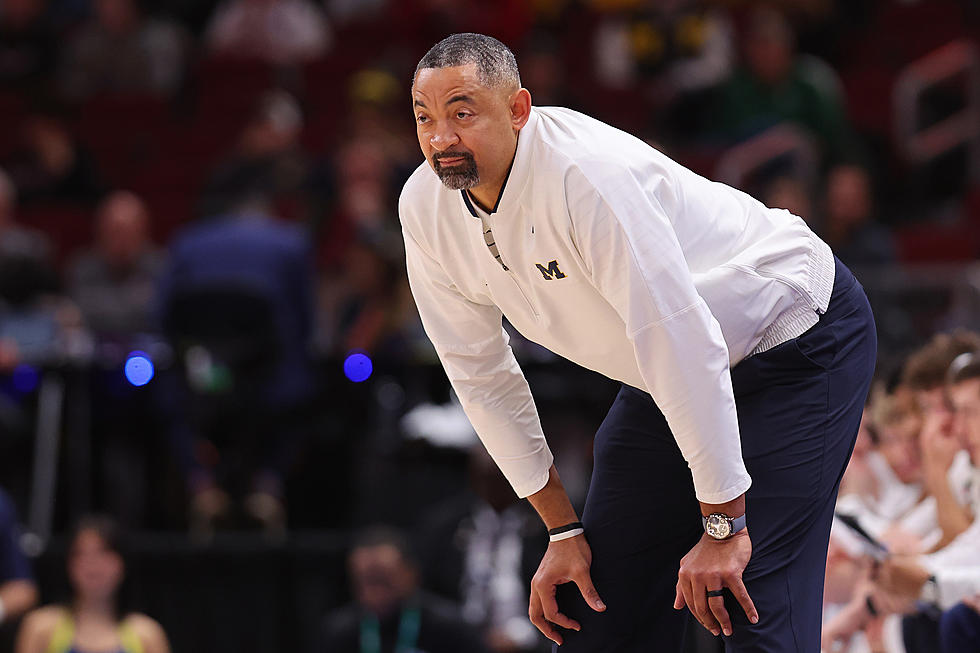
Why Michigan Basketball is NOT A Blue Blood Program
I recognize the irony of writing an opinion piece like this, and USING Juwan Howard as the main photo... but I stand by my position here... Michigan is NOT a blue-blood basketball school.
The discussion started yesterday when my friend Da'Jzon had a discussion in the hallway about whether Michigan was a Blue Blood school or not. He, in turn, wrote this piece saying they definitely were. He may think he's converted me, but I'm still leaning on the side of... no.

What is a Blue Blood School?
There are some teams that offer no question about their status as Blue Bloods - Kansas, Michigan State, Duke, North Carolina, Indiana. I'd still even consider UCLA a Blue Blood school. They aren't in the discussion a lot in recent years, but there's no denying, their dominance from 1964-1975 is unmatched. (TEN National Titles in 12 seasons!)
Then you have your fringe teams like Xavier, Gonzaga, and Villanova. All teams that, when you hear their school name, you know to look out for them in the tournament.
Even considering the fringe schools, what do ALL of these teams have in common? Specifically, what do all of these UNIVERSITIES have in common?
They're all "Basketball Schools." And basketball schools that regularly produce NBA stars.
Name me the head coach of ANY of those schools' football teams, or literally any other sport on campus? Or even a contender in those other sports in their own conference, let alone a National Title? Only die-hard fans can even come up with one example.
Of course, there are exceptions, and North Carolina and Michigan State always tend to hang around during the football season. But when you see that Tarheel logo, or the Spartan on a football helmet, it just looks weird. Like a Lions logo on a hockey jersey... cool... but not quite right.
The first sport that comes to mind is basketball and typically GOOD basketball teams that are consistently in the conversation for a National Title... even during down years.
It's as much about perception, as it is the program's success in my view.
Why Michigan isn't a Blue Blood School
NCAA writer Andy Wittry put together a good piece last April, "The origin of the term 'Blue Bloods" in college basketball."
In it, he chronicles where the term came from, and how it's been used since.
In the 1920s and then again in the 1950s, it was more used to discuss blue blood players in the pros and in college. But through the decades its meaning morphed into what we see it as today...
"... to reference an undefined elite class of college basketball programs."
We're not debating whether Michigan basketball is good... because typically, since the late 1980s, they have been. They usually finish toward the top of the conference during the basketball season.
No, we're debating on whether Michigan basketball is ELITE. Could they hang with the likes of a Coach K-era Duke, or Tom Izzo-era Michigan State, a Bobby Knight-era Indiana, or John Wooden-era UCLA.
Those teams were (and still are) consistently in the NCAA Tournament, and Consistently made deep runs. For Michigan, it's not as frequent. With a field of 64 teams, it's not insanely difficult to get into the tournament anymore, but to hang through to an Elite Eight, or Final Four is tough.
Michigan only makes THOSE trips in spurts every 5-10 years now, with the small exception being the Steve Fisher era, and the Fab 5. OBVIOUSLY, one of college basketball's best starting 5 ever assembled.
But two years and an ESPN 30 for 30 special don't make you elite... they make you flashy and briefly exciting... like a firework.
Michigan is still a team you need to look out for on the schedule, and never take lightly. But are they a Blue Blood school?
I'm sorry, but I don't believe so. Even if you ignore the "Basketball School" argument, Michigan is too up and down. Too many peaks and valleys through the decades for me to consider them a Blue Blood school, overshadowed by the success of their other programs like football and hockey.
But the great thing about sports is, nearly everything is up for debate, and every new season offers an opportunity for these teams to prove us wrong. Kind of like science - there are facts that can prove a definitive outcome... but also, there's room for change if new variables are considered.
"While the definition and membership list of men's basketball's blue bloods are in flux, depending on who you ask and when you ask them, whichever 2022 NCAA Men's Final Four participant adds a fourth, sixth, or seventh national championship to its trophy case, it'll certainly renew its membership application to the sport's club of blue bloods, thanks to a shiny, new trophy.
That we can all agree on."
Every Basketball Team From Michigan to Ever Make the Final Four
More From 107.7 WRKR-FM









